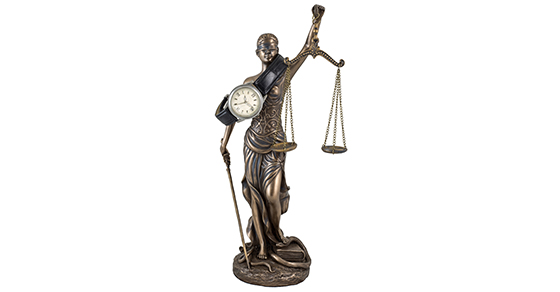Do I Have a Right to a Speedy Trial?

Justice delayed is justice denied. These words resonated recently with a Hamilton Superior Court judge when he decided to terminate the prosecution of domestic violence charges against three people. Justice Andrew Goodman delivered his decision earlier this year following an application by defence counsel for the three accused – Adeel Safdar, his younger brother Aatif Safdar, and their mother, Shaheen Safdar. In a 64-page verdict, Justice Goodman determined that the rights of all three accused to a trial within a reasonable time had been violated based on the new guidelines set in the 2016 Supreme Court of Canada decision of R v Jordan, overhauling the law in this area.
Adeel was charged with aggravated assault, assault causing bodily harm, assault, assault with a weapon, and uttering death threats. His mother previously faced the same charges. Adeel’s brother, Aatif was charged with assault causing bodily harm, assault with a weapon, and uttering death threats.
Do I Have the Right to a Speedy Trial?
Yes and No- it depends what you mean by “speedy”. A more accurate description of the right is the right to be tried “within a reasonable time”.
So What is The Right to a Trial Within a Reasonable Time?
Section 11(b) of the Canadian Charter of Rights and Freedoms guarantees the right of any person charged with an offence to be tried within a reasonable amount of time. This right protects:
- The right to liberty;
- The right to the security of the person; and
- The right to have a fair trial.
There are also secondary interests at play as well. Society has an interest in ensuring that people accused of crimes are brought before the court to answer to the charges, yet also to ensure that they are treated fairly and humanely. In essence, timely trials ensure that the public maintains confidence in the administration of justice.
11(b) also acknowledges that both the accused and alleged victims suffer by long and drawn-out proceedings. For those who are accused, living in legal limbo is stressful. Anxiety grows as a criminal proceeding looms. And for those who are victims of crime, closure and finality is denied by trials that seemingly never end.
The Jordan Framework
The Jordan framework, named after a defendant whose right was violated, is concerned with the time it takes from the laying of a charge to the conclusion of a trial. This means that from the moment an accused is charged with a criminal offence, the Jordan “clock” begins ticking away.
Under the Jordan framework, the Supreme Court set downtime limits for determining whether delay was unreasonable. Those time limits are: 30 months for trials in theSuperior Court, and 18 months for trials that begin in the lower courts. Any delay (excluding delay which the defence is responsible for) exceeding these numerical ceilings is presumptively unreasonable. Crowns have the right to rebut this presumption in a few exceptional circumstances.
If the accused believes that the delay is still unreasonable, despite the period of delay falling below the presumptive ceiling, arguments can be made that the delay was still unreasonable, even though it did not breach the time limit. The accused can do this by showing that he or she took meaningful steps in a sustained effort to move the proceedings forward, and that the case took markedly longer than it reasonably should have.
Calculating Delay
The date an accused is charged until the date of the actual (or anticipated) end of the case will amount to the total delay. Once this delay is calculated, delay that is caused by the accused (or their counsel) is subtracted from the total delay. Delay is deemed caused by the accused or their counsel if it is either:
- Delay that is waived by the accused, whether implicitly or explicitly
Delay can be “waived” by the accused. A clear and unequivocal waiver is required, so as to ensure that the accused is fully aware of the consequences of his decision. The waiver of a right is serious, and should not easily be considered waived.
- Delay that is caused by the defence
Defence delay is either directly caused by the accused or flows from actions by the defence that are “illegitimate.” Examples of defence delay include, but are not limited to:
- The Judge and Crown are ready to proceed to trial, but the defence is not;
- Frivolous applications and requests that have no merit.
When the Presumptive Ceiling is Exceeded
Even if the total delay (minus defence delay) exceeds the presumptive ceiling, the Crown may choose to “rebut” this presumption in a few very limited circumstances. “Exceptional” circumstances fall generally into two categories:
- Discrete Event(s) Caused the Delay
Discrete events are those that are either:
- Reasonably unforeseeable or unavoidable;
- Cannot be reasonably mitigated (or diminished) by the Crown or the court.
Crown attorneys are not expected to be “perfect” or achieve perfection. Crowns, like all other individuals, are human. Medical and family emergencies happen. Crown witnesses sometimes change their stories when testifying, or don’t show up to court. Crowns sometimes make inadvertent mistakes. Sometimes the court causes the delay – there are many cases to be tried, and only a limited number of courtrooms and judges that can accommodate so many hearings in a day. However, Crowns are expected to take immediate steps to address such a situation and to make good faith efforts to minimize the delay.
- The Case was Particularly Complex
Some cases are not so simple. Some cases require lots of time to prepare for. Some cases have multiple accused persons and witnesses, or are characterised by new and inordinately complicated legal issues. Police investigations that are large-scale can take months or even years, and produce a large amount of disclosure to sift through. Certain ancillary orders, such as dangerous offender applications, take more time to prepare for. Numerous Charter challenges can also contribute to a complex case. Extradition proceedings have also been recognized by the courts as complex.
Complexity is about quality, not quantity. This means that the case “as a whole” has to be complex. Crowns cannot simply blame institutional delay for complexity. They must take reasonable steps to address and avoid, if possible, the delay caused by complexity.
When the Ceiling Has Not been Met
Even if the total delay does not exceed the presumptive ceilings, courts have still determined that delay can still be unreasonable, in certain circumstances. The accused must show that:
- A Meaningful and Sustained Effort was Undertaken to Move the Case Along
The accused must show that they reasonably did everything that they could to move the case forward. Examples include:
- Putting the Crown on notice that delay is becoming a problem (the ceiling is anticipated to be reached soon);
- Cooperating and being very responsive to meeting with the Crown, and to answering to the court;
- Setting the earliest possible remands and appearance dates.
- The Case Took Markedly Longer Than it Should Have
The accused can demonstrate a number of factors to show that their case should have completed earlier:
- The local circumstances of the courts, and how a case analogous to the applicant’s submissions ordinarily proceeds in this local setting;
- Whether the Crown took reasonable steps to move the case forward.
The Safdar case, which happens to also be the longest case in Hamilton’s history, is being appealed by the Crown. The grounds of the appeal are that Justice Goodman mischaracterized periods of delay and improperly assessed the complexity of the case. The appeal is pending, and will likely not be heard for months.
Cassy Beaulac is a recent graduate of the University of Windsor Law School
Arun S. Maini is a criminal lawyer and former prosecutor with over 20 years of experience.


